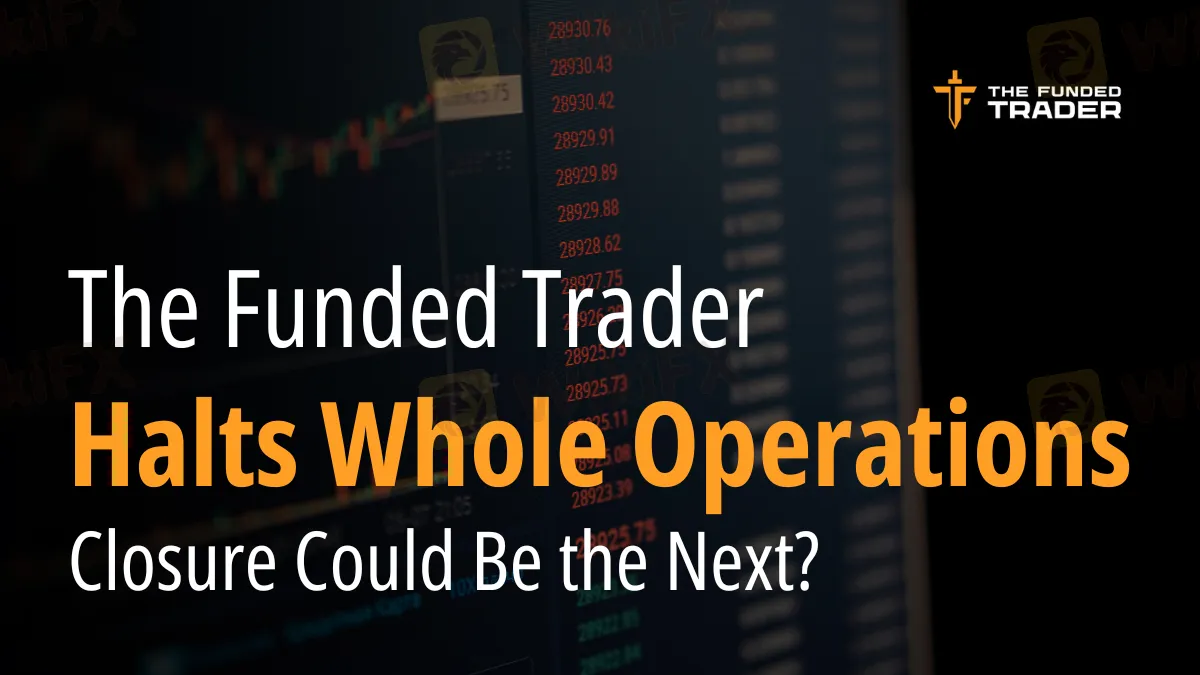What Is Spread in Forex Trading and How to Calculate It
Spread Meaning in Forex Guide: Forex spread defines the bid-ask price differential, representing the cost of entering a trade instantly.
简体中文
繁體中文
English
Pусский
日本語
ภาษาไทย
Tiếng Việt
Bahasa Indonesia
Español
हिन्दी
Filippiiniläinen
Français
Deutsch
Português
Türkçe
한국어
العربية
Abstract:The Funded Trader, once a prominent name in proprietary trading, has halted operations, sparked widespread concern, and highlighted systemic issues within the industry.

The Funded Trader, a well-regarded proprietary trading company in the past, has suspended its activities. This sudden adjustment has caused concern and speculation within the trading community as novice and seasoned traders assess the potential consequences. By emphasizing the industry's volatility, the ban raises fundamental questions regarding the future path of prop trading.
The Funded Trader is renowned for its business model, which provided capital to traders who were equipped to manage the sometimes volatile markets within a strict framework. Its technique removed the need for significant personal financial investments, enabling many individuals to participate in trading activities. However, as early as January, when customers started reporting issues like transaction slippage—the discrepancy between the anticipated and actual execution pricing—the end did seem to be in sight. Following these early warning signs of instability, a barrage of complaints on customer review platforms like Trustpilot exposed problems ranging from payment delays to malfunctions in operations.

A growing number of complaints led the prominent website PropFirmMatch, which rates and recommends proprietary trading companies, to withdraw its endorsement of The Funded Trader. The site reported several issues, such as issues with account access, unauthorized drawdowns, and lengthy transaction execution delays, all of which resulted in substantial financial losses for its consumers.
To regain the community's confidence, Platform X announced intentions for a rebranding and operational makeover by Angelo Ciaramello, the creator of The Funded Trader. Though many are left wondering about the status of their investments and the likelihood of obtaining any overdue reimbursements or refunds, this pledge hasn't done much to allay the general mistrust, particularly in light of the unclear information surrounding the firm's abrupt suspension.
Several significant issues that impact the basis of security and trust in the prop trading industry surface as the trading community awaits more information. By offering several commonly asked questions (FAQs) that highlight the difficulties and factors that traders must take into account in this volatile market, this article seeks to ease traders' anxieties.
The risks and benefits of trading with a prop firm.
There are benefits and drawbacks to working with a private trading business. From a different angle, these companies allow traders to access large quantities of money, allowing them to make larger transactions compared to when they were on their own. With this power, profits from closed transactions might skyrocket. However, trading using borrowed money has a greater risk-reward ratio. By adhering rigidly to the company's risk management protocols and trading techniques, traders may lessen the chances of losing money. Every trader should be familiar with the profit-sharing agreement's stipulations, such as the company's service compensation and their financial contribution in the form of a percentage of sales.
What should traders consider before joining a prop trading firm?
There are several factors that traders should think about thoroughly before committing to a private trading business. To do this, one must look at the company's track record, ensure it complies with all laws, and analyze its open trading methods. Thorough planning is required for all aspects of trading, including the fee structure, profit-sharing percentage, and other conditions of participation. Investors need to make sure the company's trading platform and technologies are reliable and efficient. Pay close attention to the company's compensation policy and the conditions that allow penalties to be levied. Forums and social media may also teach you about the company's history and the opinions of its current and former traders.
What are the common issues traders face with prop trading firms?
When dealing with proprietary trading businesses, traders could run into several problems. Technical mistakes may lead to missing transactions or poor execution, which directly affect profitability. Another prevalent occurrence is disagreements over how to interpret contract provisions, particularly when it comes to profit sharing and losses. Financial pressure and anger may result from traders' compensation requests being denied or delayed, for whatever reason. The firm's degree of customer service plays a major role in resolving these challenges; poor help may make matters worse and cause discontent. Finally, traders may get nervous and uncomfortable if they have concerns about the soundness and stability of the company's finances.
How can traders assess the credibility of a prop trading firm?
Analyzing a prop firm's operational transparency, financial stability, and regulatory compliance goes a long way toward determining its credibility. Traders should prioritize selecting companies that have been duly regulated and registered with reputable financial supervisory organizations. One can gain further insights into the reliability and caliber of a company's services by perusing impartial evaluations and testimonials. Engaging with the trading community via forums, social media, or networking events may provide unfiltered perspectives on the company's practices and standing. To make sure they suit individual trading demands and tastes, it's also a good idea to try the trading platform and tools offered by the company, if at all feasible.
What happens if a prop trading firm closes down?
The traders of a private trading business may experience both short-term and long-term effects from its closure. First, traders can discover that their accounts are blocked, prohibiting them from engaging in any further trading. If the business suddenly closes or runs into financial problems, the method for taking out any leftover cash or earnings may not be straightforward. Investment recovery prospects are contingent upon the firm's liquidation procedure, the existence of trader legal safeguards, and the particulars of the closure. Traders may have to navigate difficult financial and legal procedures to get their money back.
Are there regulatory protections for traders at prop trading firms?
Depending on the country, traders in proprietary trading companies have varying degrees of regulatory protection. Prop companies that operate in regions with stringent financial regulations are often required to maintain a certain level of transparency, participate in frequent audits, and adhere to capital limitations that provide a safety net for traders. These rules may also specify how conflicts between traders and businesses are resolved. If there are disputes or the business experiences financial failure, traders can nonetheless have fewer alternatives in areas with less regulation. Traders must comprehend the regulatory landscape of any company they are thinking about joining and balance the dangers and benefits presented.

Disclaimer:
The views in this article only represent the author's personal views, and do not constitute investment advice on this platform. This platform does not guarantee the accuracy, completeness and timeliness of the information in the article, and will not be liable for any loss caused by the use of or reliance on the information in the article.

Spread Meaning in Forex Guide: Forex spread defines the bid-ask price differential, representing the cost of entering a trade instantly.

Dear Global Users, Thank you for journeying alongside WikiFX. Every query you make, every review you share, and every piece of feedback you provide serves as the most vital driving force behind our continuous efforts to promote transparency and security in the trading industry.

Poland's UOKiK slaps $5.7M fines on iGenius & International Markets Live for pyramid schemes posing as trading schools. Recruitment trumped education, breaching EU laws. Explore enforcement, impacts.

As the new year begins, WikiFX extends our sincere gratitude to traders worldwide, our industry partners, and all users who have consistently supported us.
